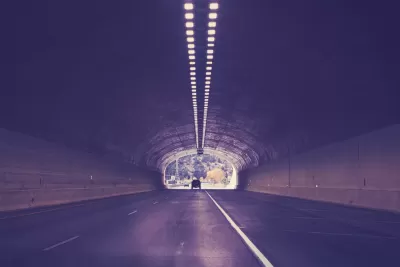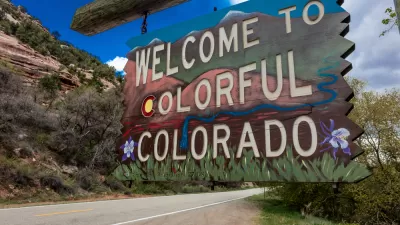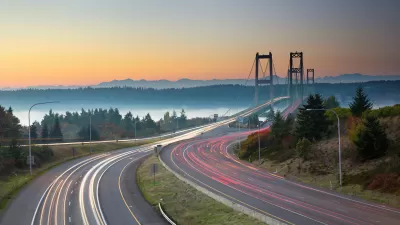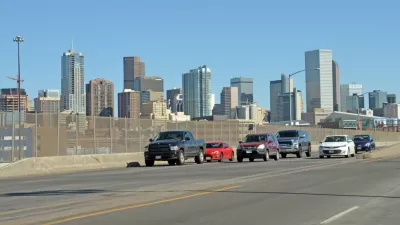A bill to ask voters in November to increase the state sales tax by 0.62 percent to fund transportation projects passed its first House committee March 22 on a partisan vote, with Democrats in support and Republican opposed.

"The House Transportation and Energy Committee got its first look at a bill that would hike the state sales tax from 2.9 percent to 3.52 percent to pay for transportation projects managed by the Colorado Department of Transportation (CDOT), plus funding for sidewalks, bike paths and mass transit," reports Marianne Goodland for The Colorado Independent. "The measure passed on a party-line vote...with the committee’s eight Democrats in favor and five Republicans opposed."
The measure was rolled out on March 8 to strong opposition from conservative Republicans at the state Capitol and from limited government advocates like the libertarian [Denver-based] Independence Institute and the Koch brothers-funded Americans for Prosperity. But the measure has the sponsorship of state Capitol leaders, including Republican Senate President Kevin Grantham of Cañon City, Democratic Speaker of the House Crisanta Duran of Denver and the chairs of the House and Senate transportation committees.
One of the state's main backers for transportation investment, Fix Colorado Roads, has not taken a position on the measure, primarily because it doesn't require that general funds be earmarked for transportation. The group wants a "permanent, reliable and sufficient funding formula for our roads," but it doesn't propose a funding option, just designation of a percentage of general funds to transportation.
Why not a gas tax increase?
Colorado's gas tax, 22 cents per gallon was last increased in 1991, 26 years ago. It is 29 percent lower than the national average of 31.04 cents per gallon.
"Because of Colorado’s Taxpayer Bill of Rights, any agreement lawmakers reach to raise taxes to pay for roads will have to go to the ballot box for approval," reports Brian Eason for The Denver Post. "And gas taxes? They aren’t as popular with the voting public as they are with state legislatures."
“We’ve done quite a bit of polling over the last two years and have found that the prospect of voters increasing their own gas tax is very slim,” said Tony Milo, executive director for the Colorado Contractors Association (CCA), which for years has lobbied for a tax increase for roads. “They’re actually much more open to some other types of taxes than they are to gas taxes.”
So the sales tax, rather than the gas tax, was chosen because it polls better. But in the long term, it is possible that a road usage charge could become the road funding mechanism. A pilot program was launched in December and is accepting new enrollments.
Hat tip to AASHTO Daily Transportation Update.
FULL STORY: Bill to raise sales tax for transportation passes first test

Alabama: Trump Terminates Settlements for Black Communities Harmed By Raw Sewage
Trump deemed the landmark civil rights agreement “illegal DEI and environmental justice policy.”

Planetizen Federal Action Tracker
A weekly monitor of how Trump’s orders and actions are impacting planners and planning in America.

Why Should We Subsidize Public Transportation?
Many public transit agencies face financial stress due to rising costs, declining fare revenue, and declining subsidies. Transit advocates must provide a strong business case for increasing public transit funding.

Judge Orders Release of Frozen IRA, IIJA Funding
The decision is a victory for environmental groups who charged that freezing funds for critical infrastructure and disaster response programs caused “real and irreparable harm” to communities.

‘Clybourne Park’ Sets Stage for Housing Equity Discussions
Clybourne Park, a play exploring race, real estate, and community tensions, can set the stage for discussion on the lasting impacts of housing discrimination, gentrification, and the fight for affordability.

Understanding Road Diets
An explainer from Momentum highlights the advantages of reducing vehicle lanes in favor of more bike, transit, and pedestrian infrastructure.
Urban Design for Planners 1: Software Tools
This six-course series explores essential urban design concepts using open source software and equips planners with the tools they need to participate fully in the urban design process.
Planning for Universal Design
Learn the tools for implementing Universal Design in planning regulations.
Caltrans
Smith Gee Studio
Institute for Housing and Urban Development Studies (IHS)
City of Grandview
Harvard GSD Executive Education
Toledo-Lucas County Plan Commissions
Salt Lake City
NYU Wagner Graduate School of Public Service





























